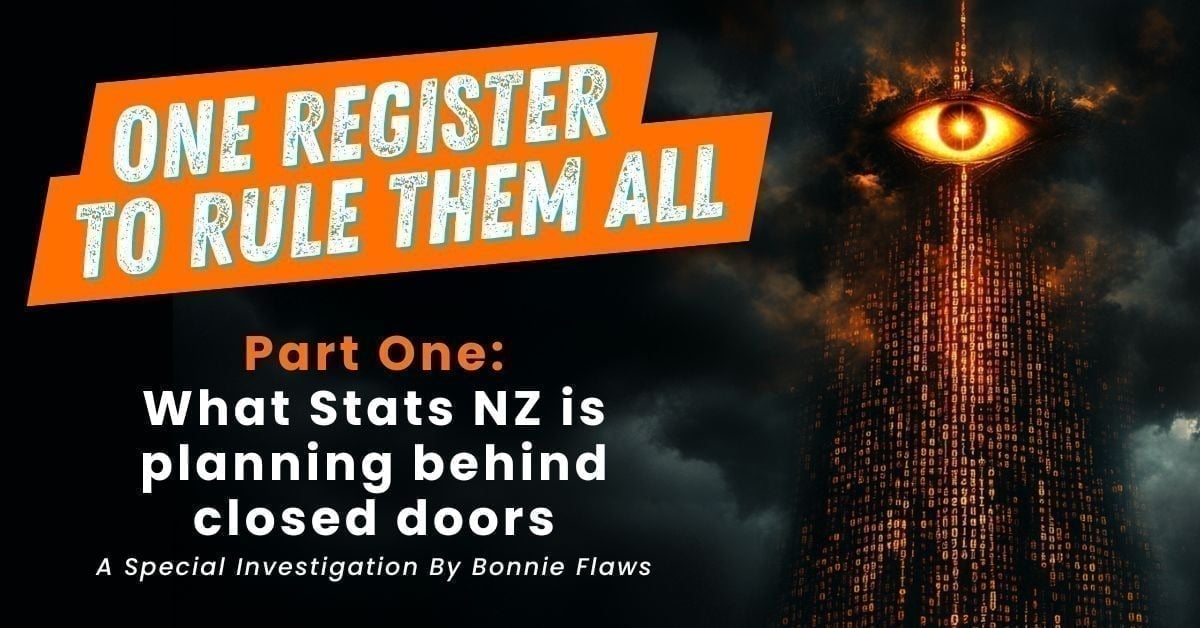
By Bonnie Flaws
Part one of a four part investigation
- StatsNZ is creating a Persistent Unique IdentIfier (PUI) for each citizen to track them over time in an Integrated Statistical Data System – or ‘Statistical Register’.
- The new system will link business, location and population registers giving a nearly complete picture of a persons life over time
- The data in this register will be updated in real time as it becomes available, moving away from data ‘snapshots’ that only show a moment in time
- A Stats NZ insider is concerned this power will be abused
- An explanation of terms can be found here
The scandal we know about
Data is digital gold, as we’ve recently seen firsthand.
The Public Service Commission investigation into misuse of data at Manurewa Marae revealed that voters on the Māori Roll in the Tāmaki Makaurau electorate were exploited and their data commandeered for what looks like political gain.
It’s alleged that personal data collected during the 2023 Census and Covid-19 vaccination efforts was misused to benefit Te Pāti Māori's election campaign.
Former chief executive of Stats NZ, Mark Sowden, rightly fell on his sword for not putting in place appropriate safeguards and working on an inappropriate “high trust model”.
It was also revealed that Health NZ failed to ensure sensitive health data was properly safeguarded at the marae. The Public Service Commission found that a “gate was left open”. Contracts lacked provisions for audits or compliance checks, allowing outside providers unrestricted access to files. In the aftermath, the agency urgently revised contracts to enable audits and conflict-of-interest checks.
Despite following privacy laws, Health NZ never ensured providers met security standards. While no misuse of data collection has been confirmed, authorities stress the need for stricter data protections to maintain public trust in health information security.
All this calls into question the quality of leadership and the depths of public service integrity. After the reports came out, the Democracy Project’s Bryce Edwards said in a scathing assessment of our institutions:
“We are often told that there is no corruption in New Zealand, and that our public service and electoral system are robust and free from manipulation and conflicts of interest. But the two official reports released yesterday about the allegations of misuse of resources and data by organisations aligned with Te Pāti Māori should put such myths to bed.”
Well, the dust hasn’t settled yet.
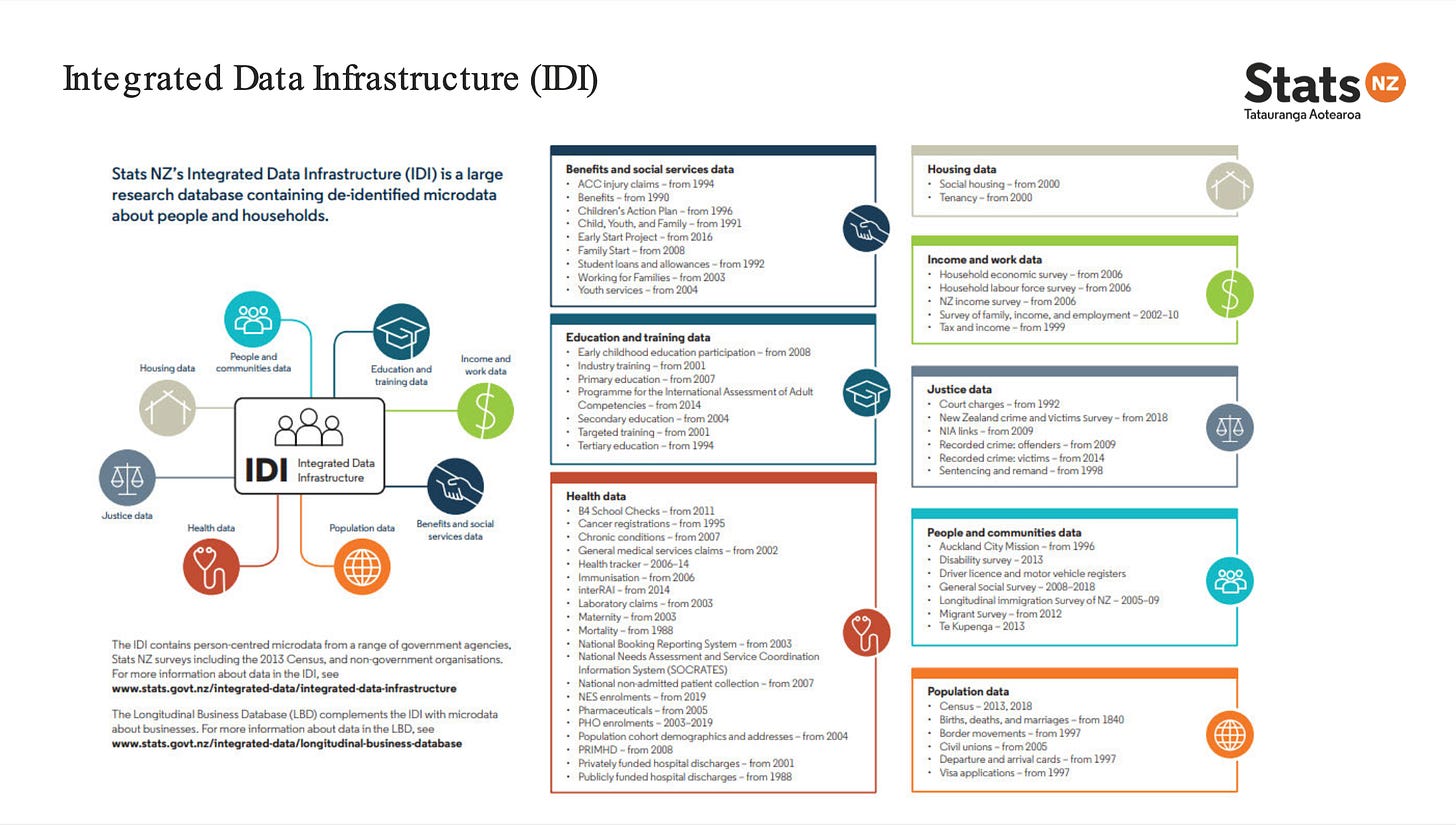 An overview of the IDI and its data sources
An overview of the IDI and its data sourcesThe IDI: the database you might have heard of (but probably not)
With all that incompetence and, perhaps, corruption on the table, consider the inherent danger of a Stats NZ project to create a unique ID for each and every New Zealand citizen currently underway.
The agency has not exactly front-footed the public communications on what it’s doing.
You may have already heard of the Integrated Database Infrastructure (IDI), a person and household database that has been developed since 2011, which collects de-identified data from tax, social welfare, the justice system, education and health records. It has attracted scrutiny from journalists and academics for holding this information, which is justified as a tool for research and public policy.
Along with data from the Justice Department, IRD, Ministry of Health, Ministry for Social Development, Ministry of Education, Kainga Ora, the IDI also compiles its people profiles from Police crime records and many other smaller sources.
It was developed under the 1975 Statistics Act, but this was replaced in 2022 by the Data & Statistics Bill, which has been a controversial piece of legislation from the off, drawing criticism from three former Government Statisticians and the Council for Civil Liberties. More to come on that, but suffice to say it has never been widely consulted on.
Hailed as an incredible research tool, it’s a double edged sword. Integrated Data played a big role in the government's response to Covid-19, including in projects run by Shaun Hendy’s team at the University of Auckland, which fed directly into the National Crisis Management Centre’s response. Treasury also used it to model the effects of different lengths of lockdown on schools, the economy and businesses, while MBIE used it to analyse the effects of lockdown on business and workers – cold comfort for many no doubt, when those policies are considered to be at the heart of the country’s increasing lack of social cohesion.
An anonymous Stats NZ insider who spoke to me on condition of anonymity believes that if the public knew more about what the IDI holds about them, they might be nervous about the potential for government overreach.
According to the source, getting IDI access does have a lot of controls and requires interviews and confidentiality training to access. But it also has weaknesses such as a lack of auditing for the researchers who might be accessing it.
Usually, a research project gets access to only a specific dataset for analysis, but sometimes a researcher might be on multiple projects over the years and accumulate access to multiple datasets, they say.
“No one checks to see if they are using their approved datasets for a specific project or not. It is up to the integrity and seniority of the researcher.”
While researchers are required to sign NDAs, more than 100 data breaches had already occurred by 2023. I’ve asked Stats NZ for more up to date figures but they were unable to get back to me in time for publication.
Also of concern, research from 2019 found that applications to use the IDI for research are reviewed internally by Stats NZ, with no mandatory external peer review or ethical approval across sectors. Furthermore, ethical standards for using IDI data vary across universities, government departments and private research entities.
All of Stats NZ data gathering powers rely on social license. But surveys have shown that there is actually low public trust around Stats NZs ability to keep data safe or even that it considers the public’s views in its decision making.
However, there may be considerably more reason to question the social license Stats NZ relies on today.
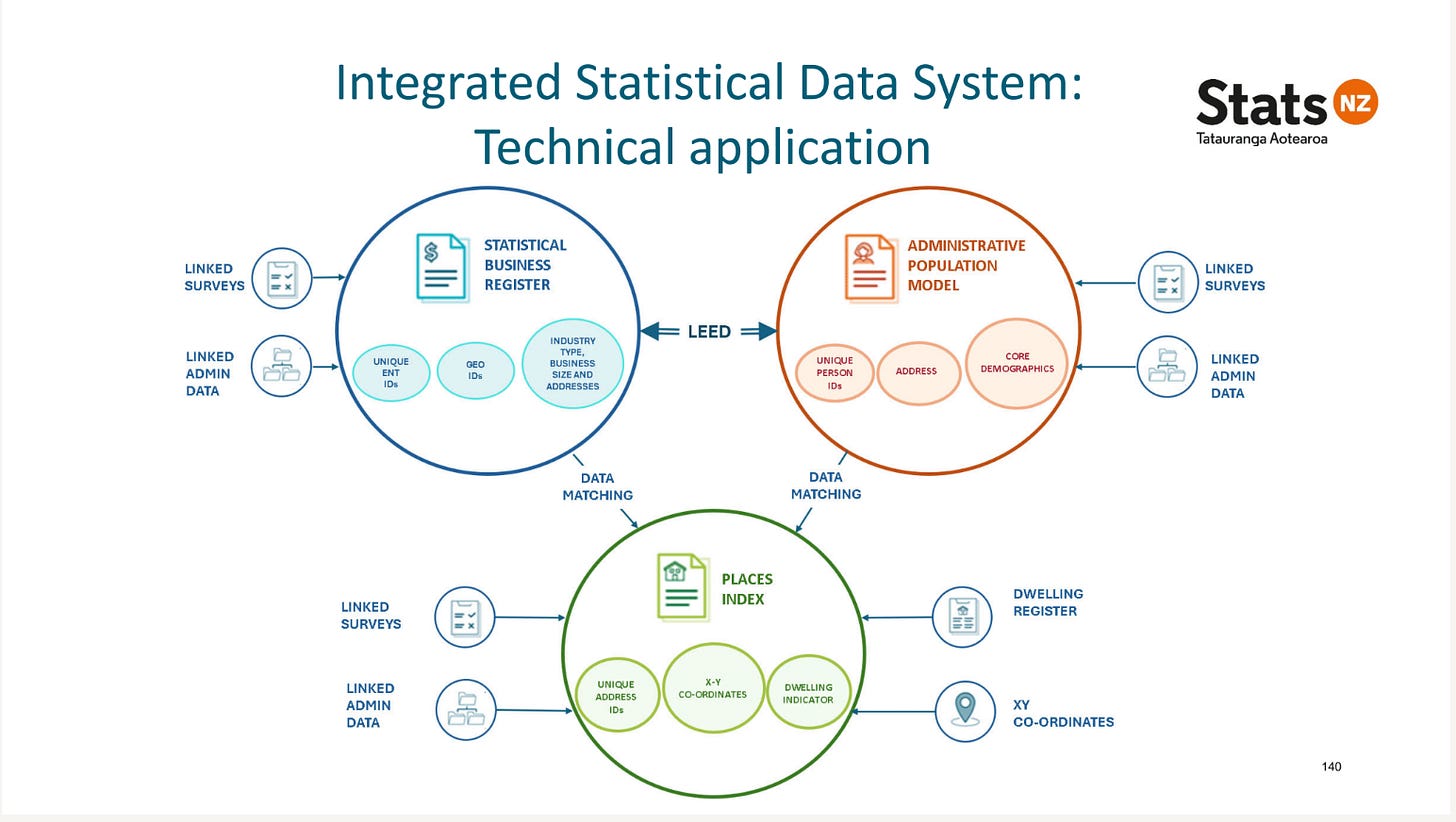
The Everything Database: person-level tracking in real time, all the time
A multi-part Official Information Act request from April 2024 has revealed that since 2022, an initiative called the Statistical Register has been underway with the goal of linking an upgraded version of the IDI with an existing location register (a list of addresses and addressable objects) and a 30-year-old business register (containing information on business profits, sector, age and size) via IRD tax data. Development consultants Allen + Clarke describe it as “unlocking high value”.
In sector jargon, this Statistical Register would be the realisation of an ‘Integrated Statistical Data System’. What I have euphemistically called the ‘everything database’, because it is not far short of that. And as we will see, there is the potential to add all kinds of other data streams to this register, such as social media, supermarket spending or telecoms data for example.
“The amount that could be controlled when you know someone’s political views and address and workplace and family history might be too much power for one organisation,” the insider says.
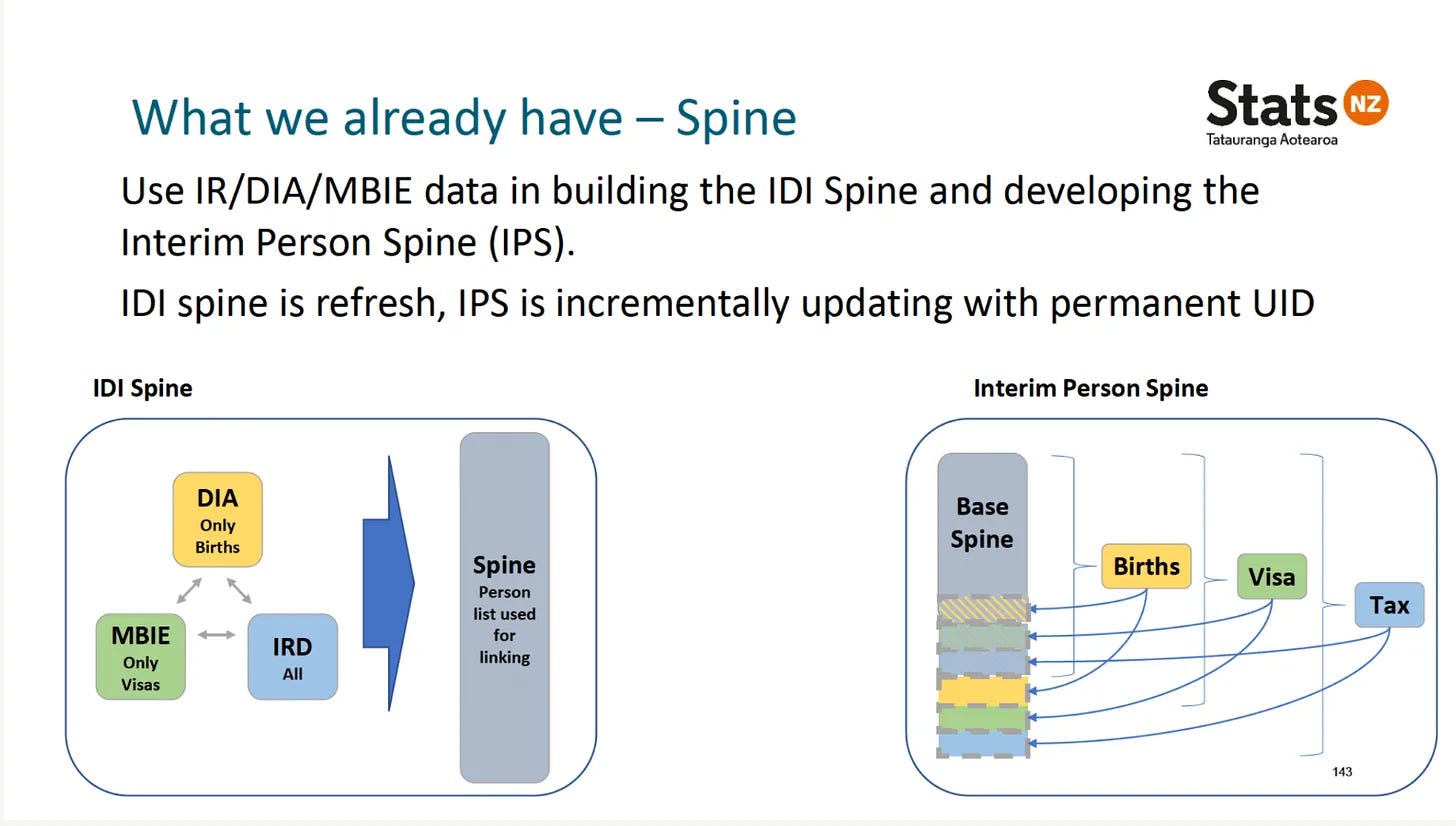
The IDI becomes the IPS
To go a bit deeper, OIA responses further reveal that before Stats NZ can do the final ‘link-up’ of their registers, it must upgrade the current IDI, which is really only a prototype for what they want to do with the statistical person register.
It is implementing what they call an Interim PersonSpine (IPS), as an improvement to the current IDI prototype, to track people. Basically a population register.
To do this, it is moving from scheduled data updates to the collection of real-time data. Currently, the IDI uses refresh timelines – moments in time when the data on a person is updated, usually three times a year, and then probabilistically linked via a ‘spine’, usually the name and birthdate, which most agencies collect.
Each time the data is collected and updated Stats NZ creates a new unique identifier for every individual in its anonymisation process, so that it can’t make a longitudinal profile for each person using past data sets.
However, the IPS does away with the ‘refreshes’ to ongoing real-time updates, as and when the information from government agencies gets supplied to StatsNZ.
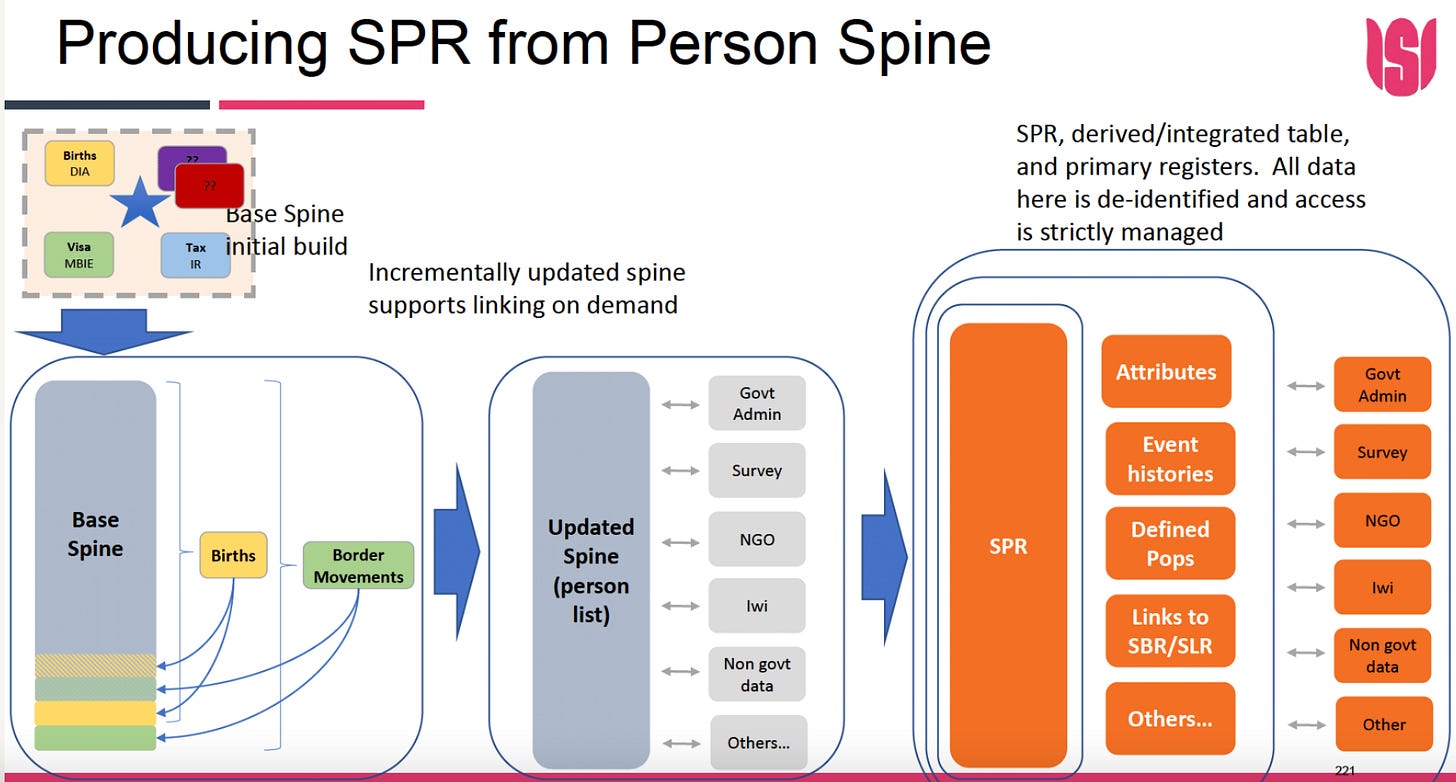
Persistent Unique Identifier
Here’s the kicker:
Once the business and location data are linked to the new IPS, they will have succeeded in creating a central register, with each person represented by a unique ID that can be tracked over time and tell a story about a person’s whole life, and even to track a person’s life events from birth. It’s referred to as a ‘Persistent Unique Identifier’ (PUI) in sector jargon.
The end result is the Statistical Register (everything database) plus a permanent digital tag for every person.
The eye of Sauron on everyone one of us, all the time, whether we want it or not.
Follow up questions were put to Stats NZ but they are now treating it as an OIA request and were not able to respond in time for publication. I will update readers with any response I receive in due course.
Part two will be published on Saturday April 19.
Originally published on Byline Babylon.

Omg
The year 2022 when Ardern, Little, Hipkins and others (with their authoritarian streak) were running the show. No oversight at all, just a ‘we know best and you pawns will simply comply'. And we think we live in a democracy. Yeah right!
Where is democracy? This is our lives and that information can be used against us as well . We need to be informed on every level . I disagree deeply with the information illegally taken . We are heading into an evil time where people are already like robots who show no empathy, care or respect for human life . Where are the GOOD leaders ??
… and our previous Prime WEF Puppet Jacinda Adern signed us up to a WEF White Paper on data collection – so who else now outside NZ holds our data and more than likely is behind the ‘Eye of Sauron’…
The time to leave this planet is fast approaching!
Assuming this further, all encompassing, invasion of our privacy cannot be stopped, the land of the free will be extinguished
Overreach already when the legislation is slipped by the very citizens it affects. Was there public discussion on this? It lacks transparency, and it's not ethical for a government to accrue that level of data on anyone. Every aspect of our lives and privacy is profiled, where does it end? Another form of surveillance and digitized humans. They will be controlling our money next and telling us how to spend it when they link us to Central Bank Digital Currency. All this cross referencing between agencies whilst it has some benefit , but to the level of what is proposed sounds rather sinister and controlling and exactly who will oversee and what measures will be in place to protect people's information. Who exactly will safeguard the data from corruption and misuse. Too many eggs in one basket, and too much control.
Wow. I know I gave permission for my medical information to be shared – for my benefit, but I certainly do not give permission for any other personal data to be integrated into a system like this. What happened to my privacy? It looks like I wouldn't have any if this goes ahead.
Timely article here as I am being ‘bothered' by Stats NZ and their mail. So far there have been 2 envelopes left in mail box adressed to “The Reisdent” and one Stats ‘interviewer' wanting to set up a day to interview me. I have declined and will not be returning calls or filling out forms. To me, this is a rerun of the Census collection bullying and harrassment but for slightly different (maybe much more nefarious) purposes. I read the ‘resident' can be charged a fine of up to $2000 if non compliant although the whole thing is apparently a “request” that I enage which implies a choice. And I will be excersing my right to choose.
Further, if you have an electricity Smart Meter and they don't like you for some reason, they can individually turn off your electricity or modify its time-of-use to be an irritant. For example, they could alter the availability of your hot water system by switching off the “controlled” portion at will, regardless of whether it was required for load-shedding purposes or not.
Very scary reading. Big brother syndrome attacking the privacy of all New Zealand citizens.
This is all part of the global push to centralize or share citizen data interoperably.
How long before it ends up in President Musk's private AI model that also has an agreement to share data with Peter Thiels ‘Palantir' (formerly known as the Total Information Awareness program).
Will it be used in the global WeChat (Everything) app otherwise known as X.
This is concerning on so many more levels than just nationally.
The digital control grid is almost upon us!!
Hmmm. I refused to fill in the form. I ignored their threats of fines and imprisonment because I simply will not give any energy to their totalitarian control.
New Zealand has been deeply imbedded for over 75 years with the Rothschilds purchasing a farm in Devonport NZ. The place they are finding underground tunnels and unspeakable crimes. We are so deeply embedded I cannot think how we are going to get out of this one. Especially with 5 eyes still in full swing and the Ch Ch earthquake a DEW from Antartica, the Mosk shootings all staged. How many kiwis are aware of that? They are doing a good job censoring us on line and in the news too. But people, we can put a stop to all this if we do not comply, let the corruption crumble and create a life we desire. We are all slaves working for the Elite, the WEF, the UN.
I am leaving NZ, I am not an enabler and there are far to many sleepy sheeple to see any hope of a new beginning.
Wake up and do something about it not just moan and groan and comply. Barrrrrrrrrr
Steven has been suggesting that those who do not wish to be tracked set up a DeGoogled phone. They might be busy integrating our data, but we can get busy protecting our location data, and reverting to some more analogue transactions including when it becomes *optional* for flying, an optout of their RealId (see US May 7th).
Time to go off grid and off social media
I wonder if they know my cat's name and CAR no. too!
I almost got a job as a researcher at IPSOS on the Victim and Crime survey, but when I did a background check on the earlier version of the survey online, I discovered that all the data I would be collecting could be added to the IDI. As a researcher for this survey, we were to innocently ask the respondents/participants whether they would mind if we amalgamated their information into a more general ‘anonymous' data base. To my astonishment about 93% said they wouldn't mind. Then i discovered that all the information gathered could then be added to their personal profile held at the IDI. At this point i turned down the job explaining my concern about the data ending up with the IDI. I almost unwittingly became a data mining tool for the govt! Thats also why I left doing research for CBG many years before – my concerns about the vulnerability and security (lack of) of respondents' data to falling into the wrong hands.
One Register to rule them all,
One Register to find them !
One Register to gather them all,
And in the darkness bind them !
In Gondwanaland, where the Shadow Govt lies !